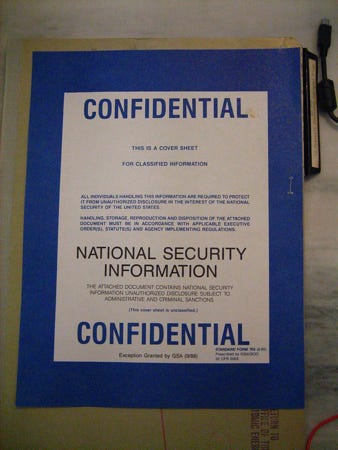
RASHI, RAMBAM and RAMALAMADINGDONG
A Quizbook of Jewish Trivia Facts & Fun

A Quizbook of Jewish Trivia Facts & Fun
Attorney General Merrick Garland appointed a special counsel to investigate the circumstances surrounding the classified documents found in Joe Biden’s garage and office. While there are significant differences between this situation and that of Donald Trump and the documents found at Mar a Lago, at the very least this has created political turmoil for President Biden and the Democratic leadership. Israel, like all countries, maintains secrecy for many government documents. In 2019, Prime Minister Benjamin Netanyahu signed a law which extended the classification time frame for many documents from 70 to 90 years, specifically secret documents maintained by such agencies as the Shin Bet, the Mossad, and the Israeli Atomic Energy Commission. Around the same time, however, Israel’s State Archive published a catalog listing more than 300,000 secret documents maintained by other Israeli agencies (including the Israel Police, the Foreign Ministry, and the Prime Minister’s Office), some dating back to the 1800’s. Only the names of the documents are included, however. Journalists, historians and others who are interested must request access to view any of these documents. Journalist Asaf Shalev filed a request with the Israel Police Agency in 2019 to receive documents about the Israeli Black Panthers, an organization which fought in the 1970’s for the rights of Jewish immigrants from the Middle East and Africa. What was the reason that his request was denied?

"Confidential" coversheet by RestrictedData is licensed under CC BY 2.0
A. Shalev was told that despite the fact that he had found many documents about the Black Panthers included in the State Archives list, they did not actually exist and therefore could not be produced.
B. Shalev was told that as a result of the law that had just been signed by Prime Minister Netanyahu, all of the 1970’s documents about the Black Panthers were still classified and could not be released until at least the year 2060.
C. Shalev was told that officials had searched for the documents he requested, but could not actually locate them among the thousands of documents which were poorly stored in government warehouses.
D. Shalev was told that he could not obtain access to the documents as he was on a list of journalists who were forbidden to receive any classified material, given his history of “anti-Israel journalism.”
E. Shalev was told that the person in charge of reviewing and releasing archival police records had died and the agency had not yet advertised for and hired a replacement.
✡ ✡ ✡ ✡ ✡ ✡ ✡ ✡ ✡
© 2025 MMJZ Services, Inc.